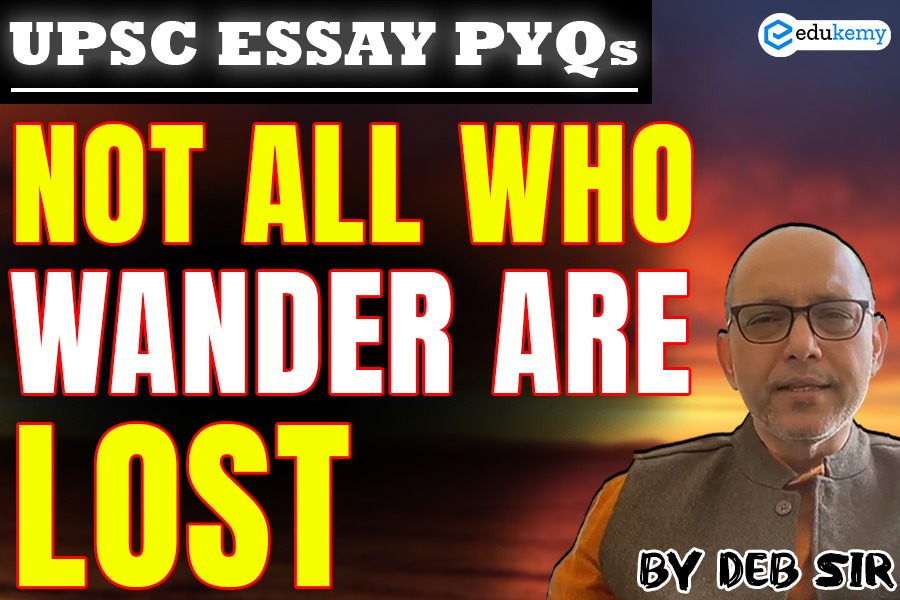784

UPSC Essay PYQ 2023: Discover how wandering fuels self-discovery, creativity, and growth beyond mere aimlessness.
Contents
Essay Key
| Component | Details |
|---|---|
| Essay Topic | Not all who wander are lost |
| Paraphrase | The essay examines how wandering and exploration contribute to personal growth and meaningful discoveries, challenging the notion that they indicate aimlessness. |
| Intent of the Essay | To explore how wandering serves as a metaphor for self-discovery and exploration across different contexts. |
| Keywords | Wander, Exploration, Self-discovery, Meaning, Purpose |
Key Arguments
1. The Significance of Exploration
- Wandering opens doors to unforeseen opportunities and enriching experiences.
- Unstructured exploration nurtures creativity and sparks innovation.
- Evidence/Data: Research indicates that exposure to diverse environments enhances problem-solving and creative thinking.
2. Wandering as a Symbol of Life’s Journey
- Life often takes unexpected turns, leading to valuable personal growth.
- The act of wandering cultivates resilience and adaptability.
- Evidence/Data: Psychological studies suggest that individuals who embrace uncertainty are more likely to experience fulfillment.
3. Cultural Interpretations of Wandering
- Many cultures prioritize the journey over the destination, such as Japan’s Kaizen philosophy, which promotes continuous learning through exploration.
- Historical figures like Socrates and Ibn Battuta demonstrate how wandering can lead to profound wisdom.
- Evidence/Data: Literature highlights that many thinkers and travelers regarded wandering as essential for knowledge acquisition.
4. Technology’s Role in Modern Exploration
- Digital advancements have revolutionized wandering, enabling virtual exploration and enhancing real-world experiences.
- Social media fosters communities that embrace exploration and discovery.
- Evidence/Data: Surveys reveal that millennials and Gen Z value experiences over material wealth, reflecting a cultural shift toward exploration.
5. Misconceptions and Challenges of Wandering
- Wandering is often perceived as aimless or unproductive, yet it frequently leads to meaningful discoveries.
- Societal expectations favor structured paths, sometimes limiting creative and personal growth.
- Evidence/Data: Economic studies highlight that many entrepreneurs achieve success through non-linear career paths and diverse experiences.
Case Studies/Examples
| Case Study | Key Insights | Relevance |
|---|---|---|
| Steve Jobs’ Journey | Jobs’ decision to wander through various fields (design, technology) culminated in the creation of Apple’s innovative products. | Illustrates that wandering through different interests can lead to visionary outcomes. |
| J.K. Rowling’s Path | Rowling’s life experiences influenced the creation of the Harry Potter series, showing how personal struggles can inform creative wandering. | Exemplifies how personal journeys enrich narrative depth and character development. |
| The Beat Generation | Writers like Jack Kerouac celebrated wandering as a means of exploring human experience, influencing a cultural movement. | Demonstrates the artistic value of wandering as a means of understanding society and identity. |

Additional Tips
- Integrate Personal Stories: Share personal experiences of wandering that led to meaningful insights or shifts in perspective.
- Incorporate Literary References: Explore books that emphasize wandering, such as On the Road by Jack Kerouac.
- Relate to Current Events: Examine how events like the pandemic reshaped perceptions of travel and exploration.
- Include Philosophical Insights: Use quotes from philosophers that highlight the connection between wandering and self-discovery.
- Discuss Health Benefits: Highlight research on the mental and physical advantages of wandering.

